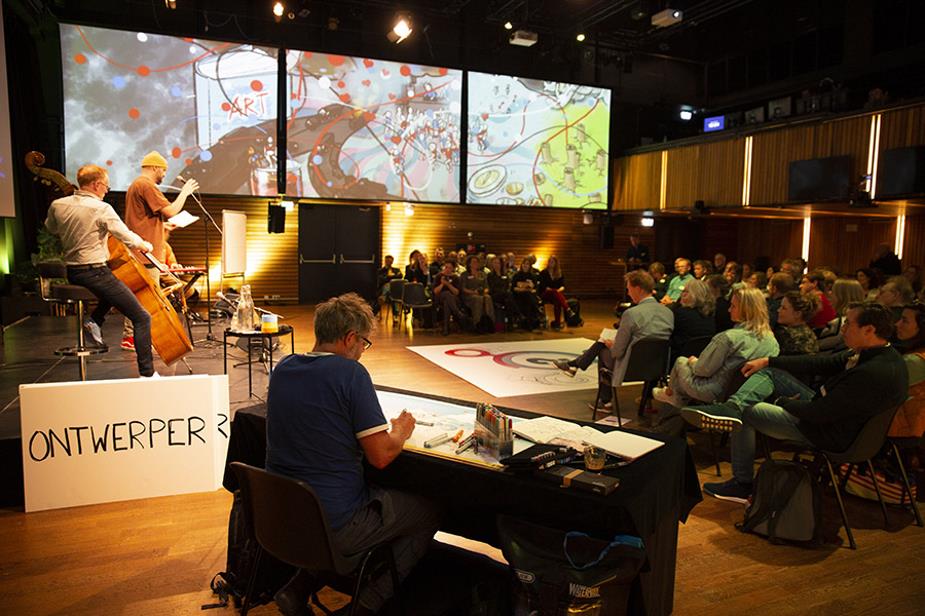Systemic Design Expertise Network starts its first research projects
9 June 2022
On Monday 30 May, the Systemic Design Expertise Network (ENSCD) held its first meeting.

On Monday 30 May, the Systemic Design Expertise Network (ENSCD) held its first meeting. Initiators including Inholland University of Applied Sciences, The Hague University of Applied Sciences and Utrecht University of Applied Sciences and various partners were introduced to the programme and the shared research team. They discussed the role that systemic design can play in complex social issues. In the meantime, the first concrete research projects are also getting off the ground. “These will enable cross-pollination between research, education and professional practice.”
Inholland University of Applied Sciences, The Hague University of Applied Sciences and Utrecht University of Applied Sciences have taken the initiative to jointly set up the ENSCD with support from the SPRONG scheme of the SIA taskforce for applied research. The goal is to use systemic design in the next eight years to tackle concrete social issues and to accelerate transitions in various areas of the Netherlands. The hope is that this will contribute to society’s earning potential. By applying systemic design, ENSCD also aims to develop a theoretical framework and practical toolbox for this multi-stakeholder approach over the next four years.
A network with different research projects
“We’re not a research project,” emphasises Wina Smeenk, Professor of Societal Impact Design at Inholland University of Applied Sciences and the initiator of the SPRONG project. “We’re a network that implements a programme which can encompass various research projects. A prerequisite is that these projects are related to the transition themes of our universities of applied sciences: a digitally responsible society, a sustainable society and healthy, social and safe society. We’re looking to join, experiment with and learn from projects and initiatives within our universities of applied sciences, but also in particular those outside our realm.”
Different teams
The core of this growing network consists of various technical teams in which lecturers from the three universities of applied sciences and our partner Rotterdam University of Applied Sciences pool their knowledge. The network also has a programme manager, a community manager and a shared research team, who work at the programme level.
Chemelot project
ENSCD tackled its first research project in the spring of this year. The Safety Delta Netherlands partnership intends to develop a procedure for companies to work together on safety at Chemelot, a large site for the chemical industry in South Limburg. “It’s a network issue and therefore an interesting one to tackle with the use of systemic design. We’re involved with researchers from the Innovation Networks research group at The Hague University of Applied Sciences and researchers from my own research group. They developed a living lab process and my research group developed the co-design canvas. We’re looking into how we can combine these two methods in a sector that we are unfamiliar with.”
Pleased about the arrival of ENSCD
Marcel Kleijn is a strategist at InnovationQuarter, the South Holland Regional Development Agency. “I’m extremely pleased about the arrival of ENSCD,” said Kleijn. “It’s important for universities of applied sciences to be involved in the innovation ecosystem. They work closely with the professional field and SMEs which are an important target group for us, and they are good at linking knowledge from practice-oriented research to the training of professionals.”
Establishing a lasting relationship
“The great thing about ENSCD is that I can access the combined knowledge of four universities of applied sciences all at once. I don’t have to approach all these institutions myself for a partnership project. The combined capacity also gives me confidence that projects will be started and implemented. Since ENSCD will exist for at least the next eight years, thanks to the SIA SPRONG grant, we can also build a long and sustainable relationship.”
Research on field labs
Just like ENSCD, InnovationQuarter focuses on complex challenges for society and brings parties together to create new business. Kleijn: “Systemic design is also part of our working method when we run different programmes in networks.” InnovationQuarter also intends to carry out a research project with ENSCD and with support from The Knowledge and Innovation Agenda for Societal Earning Power (KIA MV). “We want to conduct research on field labs with the other regional development agencies. For instance, how do you scale them up and make them more profitable? These insights into systemic design will help us make that leap!”
Cross-pollination
“The projects we carry out promote cross-pollination,” said Smeenk. “Students and researchers from the universities of applied sciences learn to work with each other’s methods and combine these. Field partners learn to apply systemic design in practical situations and by applying this in practice we also further develop systemic design, including for education, at both the undergraduate and graduate level. And perhaps even professional doctorates and PhDs.”
Do you want to know more about ENSCD? Visit the new website.